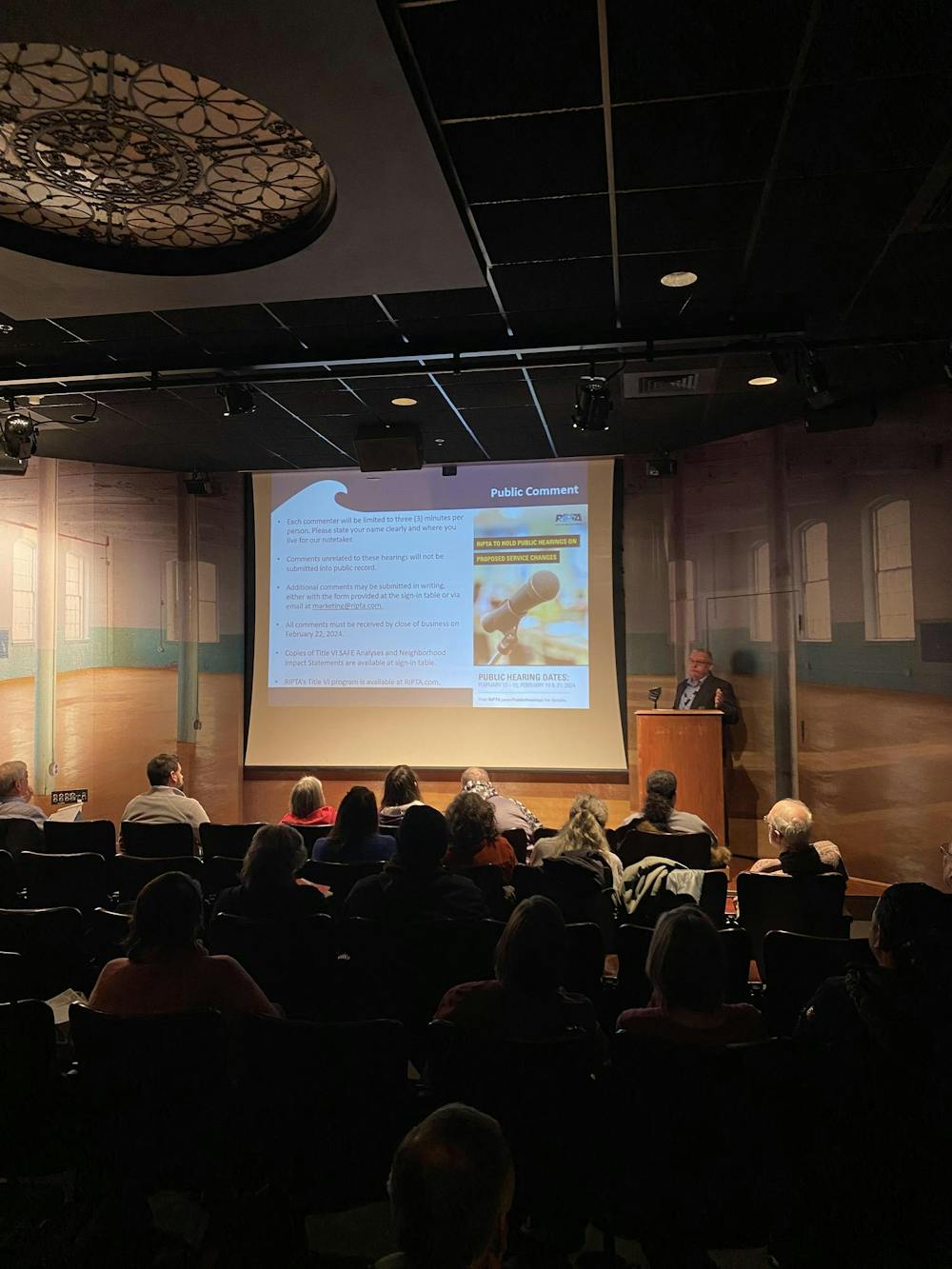Rhode Island Public Transit Authority’s goal is “100% of the service, 100% of the time,” said Ed Brown, RIPTA’s director of service planning and scheduling, in the opening of his presentation of the agency’s proposed 2024 service changes at a Feb. 20 Pawtucket public hearing. But for RIPTA riders — as evinced by the public commentary that followed — the service’s proposed changes might mean more challenges than improvements.
In January, RIPTA announced proposed service changes that will affect 33 regular bus routes. The changes include cutting route segments and weekend service, reducing trip frequency and number of trips and entirely eliminating 11 routes across Rhode Island. For some routes, the changes hope to increase trip frequency and bring “trip time changes for better service reliability,” according to RIPTA’s press release.
According to RIPTA, the proposed changes are a “direct response to its driver shortage,” reads the press release. “The labor shortage, which is affecting transit agencies nationwide, has a direct impact on the level of service that RIPTA can provide.”
RIPTA representatives said the proposed service changes would be temporary. “We plan on reinstating service levels as soon as the workforce permits,” RIPTA Communications Director Cristy Raposo Perry wrote in an email to The Herald.
“Aligning our current staffing levels with the service we can provide will eliminate missed trips and improve the passenger experience,” RIPTA CEO Scott Avedisian said in the press release.
The public hearing in Pawtucket, which was attended by approximately 55 people, was one of 11 that took place across the state between Feb. 12 and 21. RIPTA plans to “present a summary of the public hearings, including all public comment, to our Board of Directors at an upcoming Board meeting, along with our recommendations,” according to Raposo Perry.
During public comment, Rhode Island political representatives, community members and members of transit advocacy groups shared their perspectives.
The approximately 27 speakers primarily expressed their opposition to the proposed service cuts, sharing how the changes would impact their lives. Some in attendance suggested alternatives to RIPTA’s proposed changes.
Common themes included concern for student, elderly and disabled riders, as well as worries about the environmental consequences of reducing mass transportation. Many speakers also expressed apprehension about their ability to get to work and medical appointments.
Several speakers decried the elimination of Route 76, which departs from Pawtucket-Central Falls Transit Center and ends at Benefit & Thurber. One rider of the 76 noted that people use the route to get to Tolman High School, along with other stops including an elderly complex, an assisted living center and food pantries.
Raposo Perry noted in an email to The Herald that, alternatively, “Route 1 serves Tolman High School and the Blackstone Valley Emergency Food Center.”
One speaker, who identified herself as a student at the Community College of Rhode Island, said she was concerned about how the route changes would affect the ability of students to get to CCRI. “I definitely know there are a lot of students that are going to CCRI,” she said. “It would be a great difficulty (for them) to go all the way to Providence and catch one of those buses to go up to CCRI.”
Another rider said that route 73, which is facing potential elimination, is “the only bus that I can take to get to work.
“If I can’t get to work, I won’t have a job. If I don’t have a job, I won’t be able to keep my home and I literally will have nowhere to go,” she said. “There are a handful — at least five — people that I see every morning (who are) disabled who struggle to get on that bus … there is nothing else in walking distance.”
“We know and value that RIPTA is a vital service for our riders. However, without additional drivers, we are left with no option but to reduce service or eliminate low performing routes,” Raposo Perry wrote about the elimination of the 73 bus route.
Raposo additionally shared that “In 2022, RIPTA severely decreased service frequency on high performing routes in response to an unprecedented labor shortage,” but has now been “forced to eliminate routes that do not perform well instead of cutting service that carries a high ridership.”
Tom Cute, who has been a RIPTA bus driver for 44 years and now works with the Providence Streets Coalition, said he feels that RIPTA is what “the environment needs.”
“Transit jobs are green jobs,” he said.
Cute also voiced support for decreasing fares as a solution to increase ridership. “Right now, I believe RIPTA should cut the fares to a dollar,” he said, adding that “ridership went through the roof” when RIPTA introduced the R-line free fare pilot. According to RIPTA data, year-over-year ridership increased by 40% while the pilot program was in effect.“If you make it available and good,” Cute said, “people will use it.”
Raposo Perry wrote that the service changes are a consequence of a shortage of bus drivers and “are not due to low ridership.”
Cute also expressed support for increased wages for RIPTA drivers, which he believes would help with recruitment and retention. “I think the increase in wages will actually help get folks in the door because the starting wages are too low,” he said.
Raposo Perry shared that “the Board voted to approve a collective bargaining agreement with the Amalgamated Transit Union Division 618 that would increase the starting driver wage from $21.71 per hour to $25.33 per hour.”
She added “with the new increased driver starting wage, we are hoping to recruit more drivers so that we can reinstate service in the future.”
Speaking to her hopes for the future of RIPTA, Amy Glidden, the co-chair of R.I. Transit Riders — an advocacy group for public transportation in the state — highlighted the Transit Master Plan, adopted by the State Planning Council in December 2020. “We have a great plan that our government has really done very little to implement. I think RIPTA has tried where they can with very little funding.”
Raposo Perry explained that “RIPTA’s service goals, which are outlined in the Transit Master Plan (TMP) and adopted by the State, are to increase access to transit through more frequency, more days of service on most routes (7 days per week), a longer span of service, service to new areas, and potentially new modes of service.”
“At this time, we do not have funding to implement service improvements as called for in the Transit Master Plan,” Raposo Perry added.
Mikayla Kennedy is a Metro editor covering housing and transportation. They are a junior from New York City studying Political Science and Public Policy Economics.





